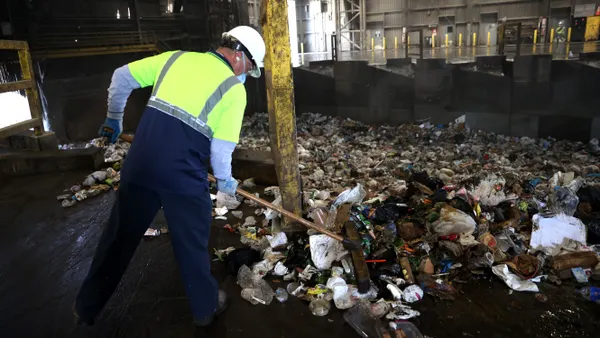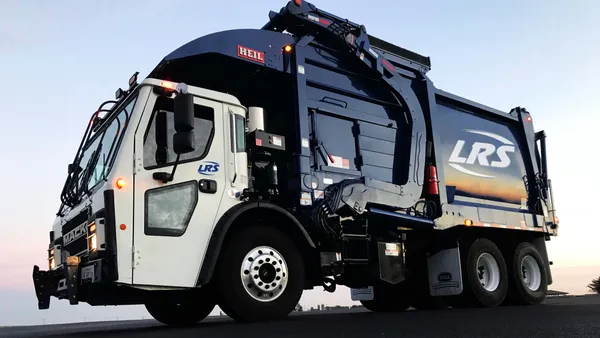Dive Brief:
- rPlanet Earth, a California-based PET recycler and food and beverage packaging manufacturer, has closed, according to multiple sources in the industry. The Vernon facility is the second PET reclaimer to close in California this year.
- The company described itself as a vertically integrated recycling and packaging plant that manufactured food-grade packaging such as PET bottles, thermoformed clamshells and cold drink cups.
- It’s unclear what prompted the closure, and rPlanet CEO Cliff Post and other company executives did not respond to requests for comment. The $100 million plant, opened in 2018, had the capacity to manufacture 80 million pounds of packaging annually.
Dive Insight:
rPlanet Earth’s closure is expected to further impact California’s regional capacity for processing PET bottles. The news comes after PET bottle recycler Evergreen Recycling closed a portion of its facility in February, citing “economic factors.” Republic Services’ joint venture Blue Polymers acquired that facility in August.
There are now four reclaimers left in the state that purchase PET bales. Players in California’s recycling industry said the regional PET recycling and processing sector has experienced multiple economic challenges, including competition with sellers of low-priced, imported virgin resin and softening demand from Mexico.
rPlanet was the main large-scale regional reclaimer that processed Grade B bales, which typically denotes curbside-collected material.
rPlanet Earth touted itself as filling a niche in the industry because of its fully integrated design and ability to accept and process curbside collected, postconsumer PET, according to its website. The company’s 302,000-square-foot facility accepted bales of both recycled PET bottles and thermoforms, which it further sorted at its facility and processed into food-grade PET flake. rPlanet Earth used the flake to manufacture a range of preform and thermoform products on site.
rPlanet Earth received numerous private and public funding resources in its early days. It received about $4 million in loans from CalRecycle in 2018, including a $2 million California Climate Investment loan for greenhouse gas reduction efforts and an additional $2 million Recycled Market Development Zone loan. It received a $3 million CalRecycle grant from the agency’s Recycled Fiber, Plastics and Glass grant program in 2017. The Closed Loop Fund also invested $1.5 million in rPlanet Earth in late 2018.
Without a reliable buyer for Grade B material, brokers like PRCC are left looking for new markets to move material, said Sally Houghton, executive director of the PET Recycling Corporation of California, which purchases PET bottles for resale to reclaimers.
“Now there’s very limited end-market demand for that material,” she said.
There are a few export options, but they are typically lower-paying markets and don’t represent a significant volume, she added. PRCC has mostly been storing Grade B bales since July while it looks for buyers. Persistently tough markets in California have put a strain on PET reclaimers, Houghton said. She fears more closures could come, in part due to low sales that have lasted for the past two to three years.
An influx of cheap plastic imports, including from Asia, has made it challenging for domestic reclaimers to compete, said Paul Bahou, president at Global Plastic Recycling, a California PET reclaimer that processes recycled flake from bottles and thermoforms. Its sister company, Global Plastics, uses the material in sheeting and thermoforming.
“It’s so tough to make money right now,” Bahou said. “The actual cost to compete with these imports is that you're selling at a really low price.”
Up until recently, Mexico had been increasing its recycling capacity, driving up bale prices, Bahou and Houghton both said. That further squeezed competition until around May, when Mexico’s buyers started backing off.
At that point, bale prices for both A and B grades fell dramatically, Houghton said. Yet those lower prices still weren’t enough to help domestic reclaimers compete with cheap imports of both rPET and virgin resins.
Meanwhile, California law requires beverage containers under the bottle bill to contain at least 25% recycled content. But recycled content mandates haven’t done much to help drive demand, Houghton said. “Mandated content doesn’t require rPET to be domestically sourced, so end buyers chose the cheaper option or opted to buy cheap virgin to reduce their overheads,” she said.
The challenging market conditions mean the remaining reclaimers in California are not running at full capacity, which is unusual because summer is typically a time for higher productivity, Bahou said. That’s another reason bale prices continue to sink, he said. “The market is just incredibly soft right now,” he said.
Further complicating the market dynamics is the status of the state’s Plastic Market Development Payment program, a subsidy for reclaimers that wash and convert bottles into resin or sheet, Bahou said. That subsidy is set to expire on Dec. 31, and reclaimers hope the state legislature votes to extend it.
In the near term, recyclers are wondering how tariffs might impact market dynamics and procurement decisions, but both Houghton and Bahou said there’s too much uncertainty to make an informed guess. The Trump administration announced Sept. 8 that it would add PET resin to its list of reciprocal tariffs.
California is also in the process of implementing SB 54, the state’s extended producer responsibility law for packaging. That law will ramp up recycled content requirements, add new “responsible end market” criteria and other regulations as it takes effect starting in 2027.
“There must be sufficient converter capacity and high-quality rPET available to meet these regulations,” Houghton said. “Without functioning domestic reclaimers, California risks becoming dependent on imports, jeopardizing the state’s goals and investments.”












